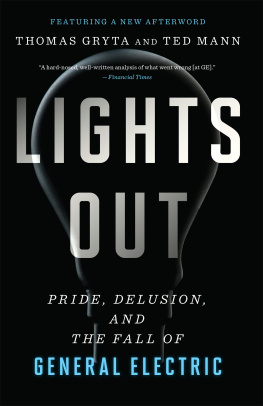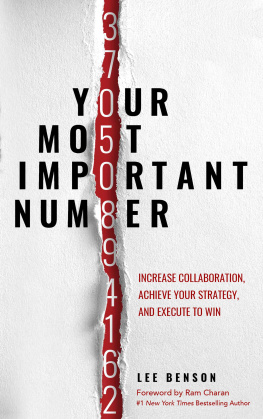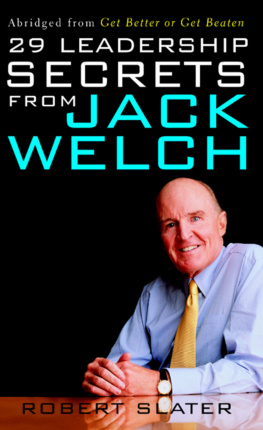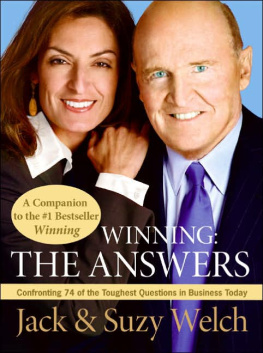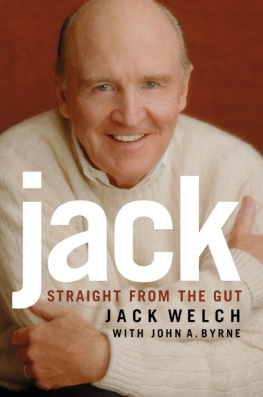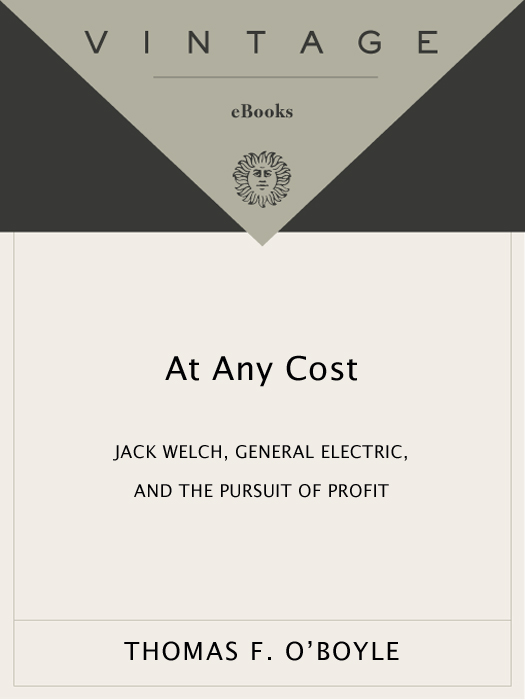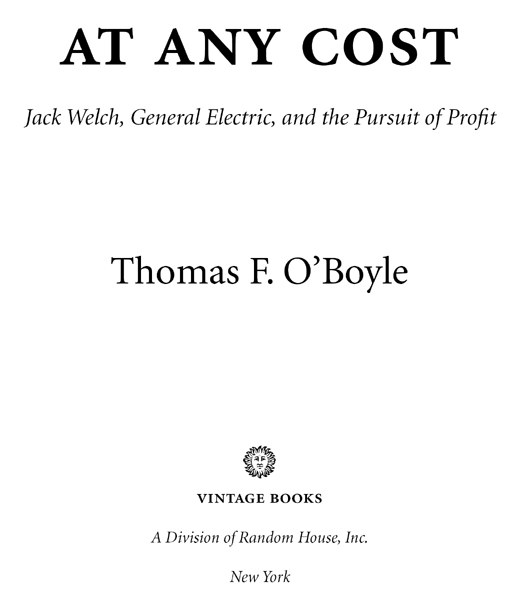Acclaim forThomas F. OBoyles
AT ANY COST
Rather than the stunningly successful executive we thought we knew, OBoyles At Any Cost presents a thin-skinned monarch who has destroyed a company and a culture in the pursuit of short-term profit. OBoyles muckraking is impressive.
The New York Times Book Review
Welch and the GE public relations department soon will be answering lots of queries if At Any Cost is as well read as it deserves to be.
Detroit Free Press
OBoyle has made Welch the poster boy for modern capitalism and all the ills that accompany it: downsizing, deal-making, ethical violations, pollution.
The Boston Globe
A carefully documented, deeply researched, and impassioned indictment of a man, a giant corporation, and a way of doing business at terrible costs.
Kirkus Reviews
OBoyle argues in this scathing examination of Welchs tenure to date that GEs growth has come with a heavy priceespecially to the companys employees.
Publishers Weekly
Thomas F. OBoyle
Thomas F. OBoyle has been writing about business and management issues since 1979. He covered U.S., European, and Asian industrial corporations for eleven years at The Wall Street Journal. He was named business editor of the Pittsburgh Post-Gazette in 1994. He lives with his wife and three children near Pittsburgh.
FIRST VINTAGE BOOKS EDITION, SEPTEMBER 1999
Copyright 1998 by Thomas F. OBoyle
All rights reserved under International and Pan-American Copyright Conventions. Published in the United States by Vintage Books, a division of Random House, Inc., New York, and simultaneously in Canada by Random House of Canada Limited, Toronto. Originally published in hardcover in the United States by Alfred A. Knopf, Inc., New York, in 1998.
Vintage and colophon are registered trademarks of Random House, Inc.
Photographic credits for section following Bob Emmons
The Library of Congress has cataloged the Knopf edition as follows:
OBoyle, Thomas F.
At any cost: Jack Welch, General Electric, and the pursuit of profit / Thomas F. OBoyle.
p. cm.
1. General Electric CompanyManagement. 2. Electric industriesUnited StatesManagementCase studies. 3. Welch, Jack (John Francis), 1935. I. Title.
HD9697.A3U555 1999
338.7621380973dc21 98-15011
eISBN: 978-0-307-77323-4
Author photograph by Martha Rial
www.vintagebooks.com
v3.1
For Mae and Louise,
and in memory of Thomas E. OBoyle
Turning and turning in the widening gyre
The falcon cannot hear the falconer;
Things fall apart; the centre cannot hold;
Mere anarchy is loosed upon the world,
The blood-dimmed tide is loosed, and everywhere
The ceremony of innocence is drowned;
The best lack all conviction, while the worst
Are full of passionate intensity.
William Butler Yeats,
The Second Coming
AUTHORS NOTE
The General Electric Company is without doubt one of the most fascinating and important institutions in twentieth-century American society, and I have been fortunate to have had the cooperation of hundreds of people in my investigation of it. Regrettably, however, Jack Welch and a number of other company executives were unwilling to be interviewed. I have made a serious effort to gain Mr. Welchs input, to give him and those others an opportunity to respond regarding the issues and concerns raised in this book, but my requests have been unavailing. Instead, I was referred to GEs Corporate Public Relations office, which to a responsible journalist is not the same as conducting an in-depth interview. Regardless, I have continued to refine the books content and to investigate and verify the facts. I have done everything in my power to write a balanced and fair account of General Electric, gathering information and viewpoints from as many sources as possible. I have spoken to those who are fans of GE and Mr. Welch, and those who are not.

PROLOGUE
J EFF D EPEW HAD THE JOB of a lifetime. The General Electric Company, Americas most prestigious and profitable corporation, had sent Depew to Japan as its overseas emissary to run a subsidiary that sold $100 million worth of electrical goods annually in Asia and the South Pacific. He was a thirty-something executive, president of GE Electrical Distribution and Control Asia/Pacific Limited, negotiating deals with people twice his age. A fast-track workaholic in a corporation with hundreds of fast-track workaholics, he was in the express lane, having raced through eleven jobs in nine years. Each new job had brought more money, more status, more responsibility, more deals to be done.
Depews personal and professional lives had blended into a big blur. He could no longer tell where one began and the other ended; his ex-wife had said more times than he cared to recall, Jeff, youre married to GE, not to me. Depew couldnt disagree because he was devoted to his job and because he loved it. He got a jolt out of working for General Electric, and the man reputed to be the greatest dealmaker in American business, Jack Welch. Depew loved the shooting highs he got from making deals. It may be hard to imagine anything less glamorous than the prosaic electrical products that Electrical Distribution and Control made, but ED&C, as it was called, had the same deep appeal common to all of GEs businessesthe opportunity to execute bold strategies and global alliances. Depew was a geopoliticist, and making deals appealed to his sense of international intrigue and high adventure. He loved the strategizing, the finessing, the give-and-take. To him, doing deals was an art form, like kabuki or bonsai, and doing them in Japan was even more artful.
Depew was the type of executive who made Jack Welch smile: smart, aggressive, confident, young. He had been hired in 1981, the same year Welch was elevated to CEO and began the most systematic program of change ever attempted in corporate America. Depew was anointed as an acolyte, a high achiever, and a survivor as well. He went through management boot camp with five other MBAs, all graduates of Harvard, Stanford, Northwestern, or Depew had a salary of $123,000 a year, and with the performance bonuses, deferred compensation, stock option plans and other perks, his annual compensation easily surpassed $500,000, putting him among the four hundred or so most highly compensated executives in the company. The amenities werent bad either: membership in the exclusive Tokyo Birdie Club, a chauffeured Lexus LS400, and housing in a fully subsidized, fully furnished apartment. But an even bigger reward was the ability to exercise power, at a much earlier age than was typical in the best companies of corporate America.
The deal that consumed Depew in the spring and summer of 1991 was the biggest of his ten-year career at GE. It was very important to General Electric because its Electrical Distribution and Control division was in trouble. For more than a century GE had been the leading manufacturer of basic electrical goods like control panels and circuit breakers, the dominant player in the dominant market, America. By the late 1980s, however, the business was changing. Global dominance was now the ticket to success, and ED&C had very little global presence. The number-one player in the world, Frances Groupe Schneider, had bought out several American players to establish a preeminent position in the U.S. market, while GE flailed about trying to find a coherent strategy that would fend off its French rival. GE had executed several small transactions in Europe, and it had also established a joint sales venture with Fuji to sell products in Japan. Neither initiative had been successful. Larry Bossidy, the then vice chairman, had given Depew specific instructions to cultivate a relationship with Mitsubishi Electric, one of Japans premier electrical equipment manufacturers and a Fuji rival. Depews mission was clear: to improve radically GEs position in Japan. Success in this assignment will position you well for continued career growth when you return to the U.S., ED&C president Stephen Rabinowitz had written in the August 1990 letter offering Depew the promotion. And Mitsubishi seemed to be the path to success.



